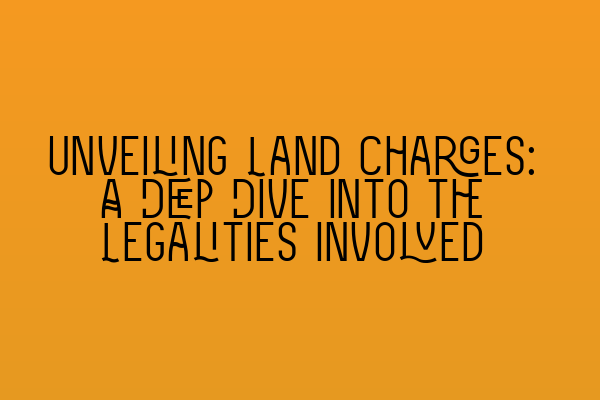Unveiling Land Charges: A Deep Dive into the Legalities Involved
Welcome to the SQE Property Law & Land Law blog! In today’s article, we will be diving deep into the legalities surrounding land charges. Land charges play a crucial role in property transactions, and having a solid understanding of them is essential for any aspiring solicitor or property law professional.
What are Land Charges?
Land charges are restrictions or encumbrances that affect land or property. These charges are registered with the Land Charges Department and serve as notices to potential buyers or lenders of any interests or rights that may affect the property. Understanding and dealing with land charges is an integral part of property law practice.
There are various types of land charges, including:
- Restrictive Covenants
- Easements
- Legal Charges
- Equitable Charges
- Mortgages
Now, let’s take a closer look at each of these land charges and their legal implications:
1. Restrictive Covenants
Restrictive covenants are contractual obligations that limit or restrict the use of land or property. They are typically included in the title deeds to protect the interests of the landowner or a particular group of individuals. For example, a restrictive covenant may prohibit the construction of additional properties on a piece of land or restrict its use for commercial purposes.
Understanding restrictive covenants is crucial when advising clients on property purchases or sales. They can have significant implications for the use and development of land.
2. Easements
Easements are rights granted to individuals or entities that allow them to use someone else’s land for a specific purpose. Common examples of easements include rights of way, rights to access, and rights to use utilities or services that run through the land.
It is essential to identify and understand any existing easements when dealing with property transactions. They can significantly impact the rights and obligations of the parties involved.
3. Legal Charges
Legal charges are registered charges against a property that secure a debt or loan. They provide the lender with security, ensuring that if the borrower defaults on the loan, the lender has a claim against the property.
A thorough understanding of legal charges is essential when advising clients on mortgage financing or property investments. It allows solicitors to assess potential risks and protect their clients’ interests.
4. Equitable Charges
Equitable charges are similar to legal charges but are not registered with the Land Charges Department. Instead, they are equitable interests or rights that give the lender a claim to the property in the event of default.
It is crucial to identify and address any equitable charges when dealing with property transactions. Failing to do so may result in unforeseen complications or disputes down the line.
5. Mortgages
Mortgages are a well-known form of land charge. They are legal contracts that allow individuals to borrow money from a lender to purchase a property. The property acts as security for the loan, and the lender has the right to take possession and sell the property if the borrower defaults on the mortgage payments.
When dealing with mortgages, solicitors play a vital role in ensuring that all legal requirements are met and that their clients’ interests are protected.
Now that we have explored some of the key land charges, it is essential to understand how to search for and register these charges. The Land Charges Department maintains a searchable register, allowing solicitors and property professionals to access and obtain information regarding land charges.
Searching for land charges involves submitting an official search form to the Land Charges Department, specifying the details of the property and the type of search required. The department then conducts a search and provides the necessary information regarding any registered land charges.
Registering land charges is equally important. When advising clients, solicitors must ensure that any relevant charges are duly registered to protect their rights and interests.
Aspiring solicitors and property law professionals must develop a comprehensive understanding of land charges and their legal implications. This knowledge forms the foundation for successful property law practice and enables professionals to effectively advise their clients.
For further study materials and resources to develop your property law knowledge, be sure to check out our related articles:
- 44. Essential SQE Textbooks: Building a Solid Foundation for Exam Prep
- 43. Unraveling the SQE Stages: A Roadmap to Success
- 41. Test Centers for SQE: Convenient Locations for the Exam
- 39. Skills Assessed in SQE: Understanding the Exam Content
- 40. Interviewing in SQE: Mastering the Assessment Process
We hope this deep dive into the legalities surrounding land charges has provided you with valuable insights and knowledge. If you have any questions or need further guidance, do not hesitate to reach out to the expert team at SQE Property Law & Land Law.
Disclaimer: This article is for informational purposes only and does not constitute legal advice. Always consult a qualified solicitor for advice specific to your situation.
